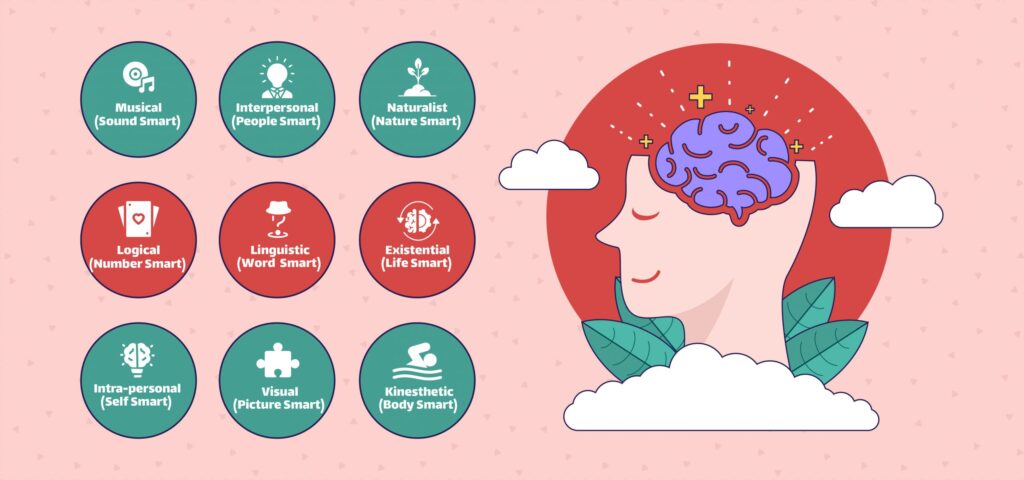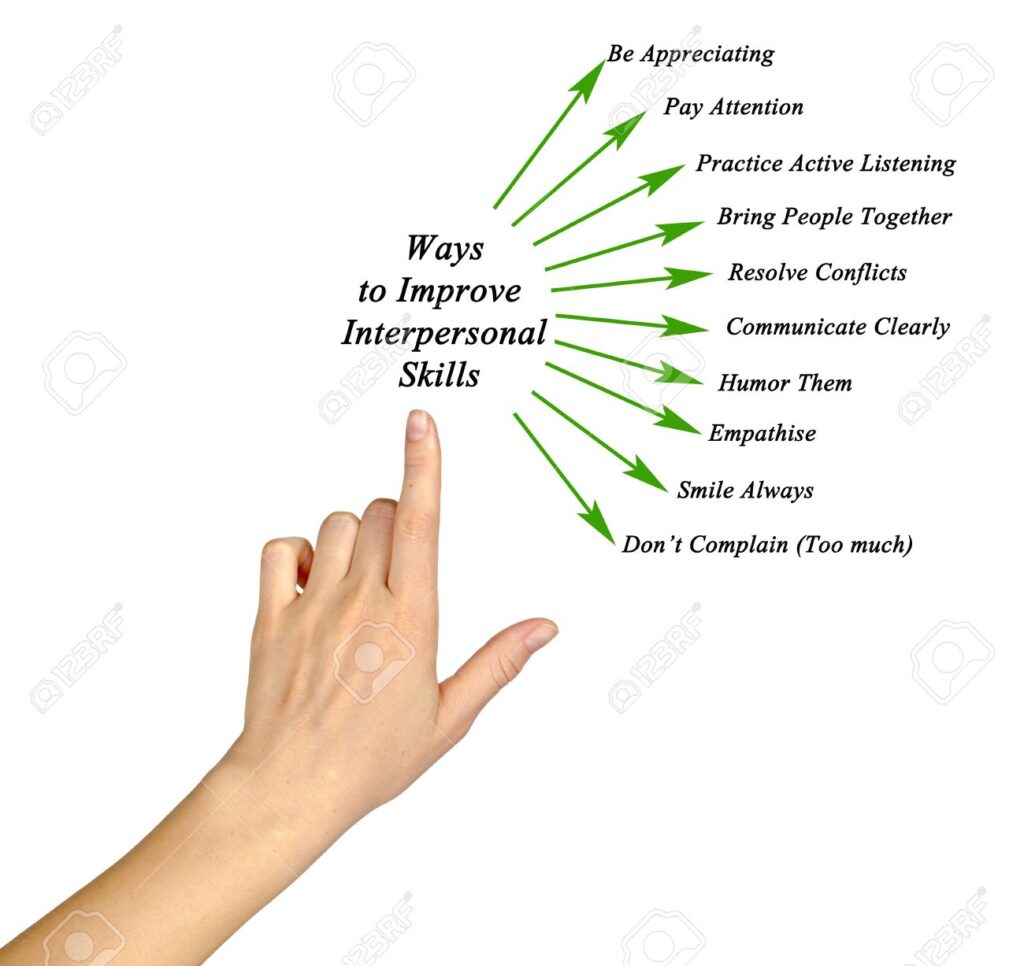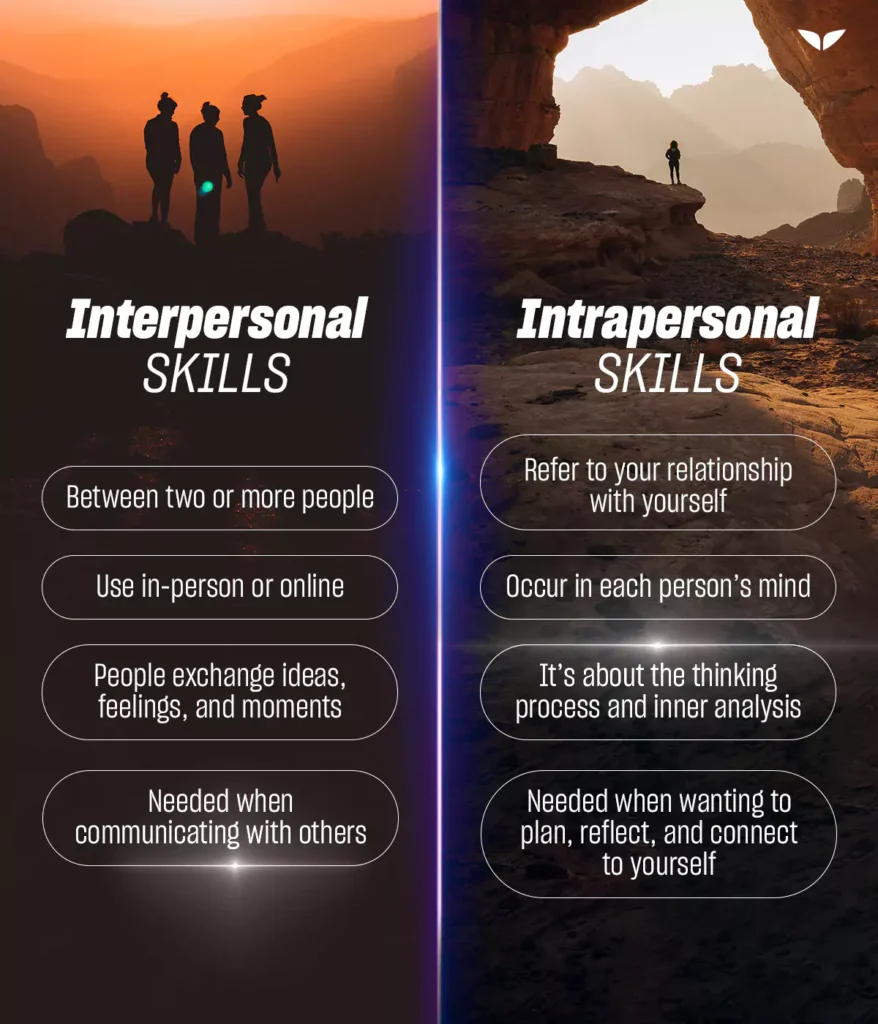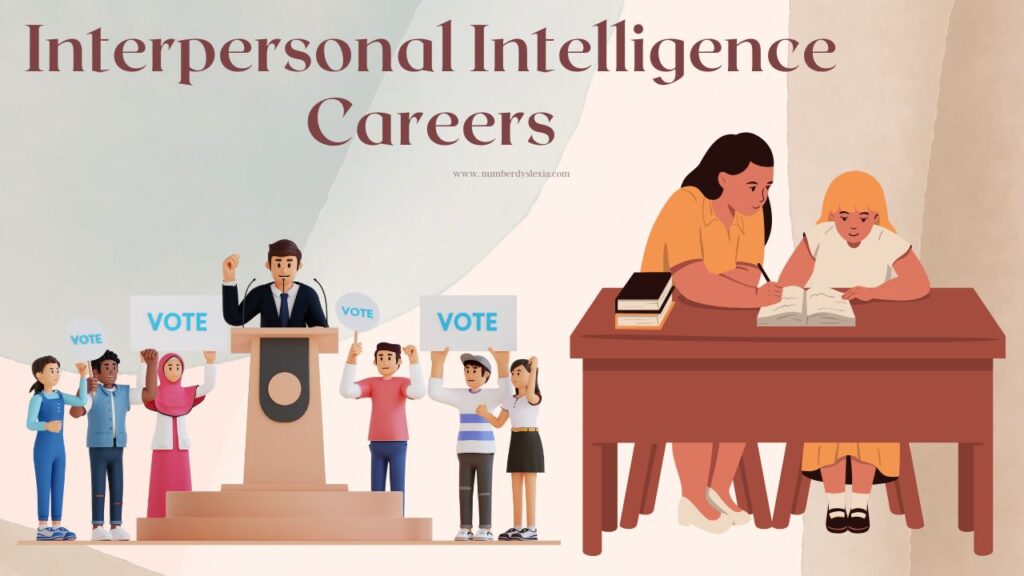Interpersonal Intelligence: How to Develop it

Interpersonal intelligence refers to a person’s ability to bond and connect with other people and manage relationships. Improving your interpersonal intelligence skills can help you to more quickly understand other people’s emotions and determine how best to interact with them—based on those emotions.
What is Interpersonal Intelligence?
Table of Contents
Toggle
Interpersonal intelligence is the ability to understand how people feel and then interact with them in a way that is appropriate for the situation. It involves having self-awareness, which means being conscious of your own emotions and behaviors and then adjusting them to better communicate with those around you. They are often skilled communicators and can easily engage in social interactions.
There are many professions that use interpersonal intelligence to communicate with others in a way that is relatable and helpful, like teachers, actors, counselors and politicians
Characteristics of Interpersonal Intelligence:

- Paying close attention to others when they speak.
- Having a wide circle of friends and acquaintances.
- Introducing people to each other and fostering new relationships.
- Having the ability to sway others’ opinions or decisions.
- Viewing situations and problems primarily through the lens of interpersonal dynamics.
- Being able to grasp the underlying reasons and drives behind people’s actions.
- Often being the focal point of conversations and social gatherings.
- Initiating conversations effortlessly, even with strangers.
Traits of Interpersonal Intelligence

- Empathy: Ability to sense and understand the feelings, thoughts, and experiences of others.
- Communication Skills: Proficiency in both verbal and non-verbal communication, including listening, speaking, and reading body language.
- Social Skills: Ease in interacting with others, forming connections, and working in groups.
- Conflict Resolution: Ability to mediate and resolve conflicts, negotiate effectively, and find common ground.
- Cooperativeness: Tendency to work well in teams, collaborate, and foster a cooperative environment.
- Leadership: Capability to inspire, guide, and influence others, often taking initiative in group settings.
Benefits of Interpersonal Intelligence
Effective Communication:
Effective Communication: Better at expressing thoughts and feelings clearly and understanding others, leading to fewer misunderstandings and conflicts. Individuals with strong interpersonal intelligence excel in both verbal and non-verbal communication. They can express themselves clearly and understand others’ messages accurately, fostering better relationships and reducing misunderstandings.
Empathy and Understanding:
People are adept at understanding the emotions, motivations, and perspectives of others. This enables them to build rapport, show compassion, and offer support, leading to stronger interpersonal connections. Empathy is the ability to emotionally understand what other people feel, see things from their perspective, and imagine yourself in their place.
Conflict Resolution:
Conflict resolution is the process by which two or more parties find a peaceful solution to a disagreement. Conflicts are natural in any human interaction, and effective conflict resolution skills are crucial for maintaining healthy relationships, both personal and professional. They are also skilled at resolving conflicts and navigating difficult situations diplomatically. Skilled in mediating disputes and finding amicable solutions, which can reduce tension and foster a more harmonious environment. By understanding various viewpoints and finding common ground, they can mediate conflicts and facilitate peaceful resolutions.
Networking and Relationship Building:
People with interpersonal intelligence excel at networking and building relationships that last. They can easily connect with others, establish trust, and cultivate valuable professional and personal connections, which can lead to opportunities for career advancement and personal growth.
Enhanced Emotional Intelligence:
Interpersonal intelligence is closely linked to emotional intelligence (EQ). Individuals with strong interpersonal skills are often emotionally intelligent, capable of managing their emotions effectively and understanding the emotions of others, leading to healthier relationships and improved overall well-being.
Teamwork and Collaboration:
Teamwork and collaboration are essential for achieving collective goals and driving success in various settings, from workplaces to community projects and academic environments. While often used interchangeably, these concepts have subtle differences: teamwork involves working together towards a common goal, whereas collaboration emphasizes the process of sharing knowledge and resources to achieve that goal. They excel in collaborative environments and contribute positively to team dynamics. By fostering open communication, trust, and cooperation, they help teams achieve their goals more efficiently and effectively.
Ways to Develop Interpersonal Intelligence

- Active Listening: Practice truly listening to others without interrupting. Focus on understanding their perspective and feelings.
- Empathy Exercises: Put yourself in others’ shoes to understand their emotions and viewpoints. Reflect on how you would feel in their situation.
- Improve Communication Skills: Work on both verbal and non-verbal communication. Pay attention to your tone of voice, body language, and facial expressions.
- Engage in Group Activities: Participate in team sports, clubs, or group projects to improve your ability to work with others.
- Conflict Resolution Training: Learn and practice techniques for resolving conflicts amicably, such as negotiation and mediation skills.
How to Develop Interpersonal Intelligence
Developing interpersonal intelligence involves honing your ability to understand and interact effectively with others. This skill is essential for building and maintaining relationships, working collaboratively, and leading effectively. Here are some strategies to help you enhance your interpersonal skills:
1. Active Listening
Pay close attention to what others are saying without interrupting. Show genuine interest in their perspective, ask clarifying questions, and reflect back their thoughts and feelings to demonstrate understanding. Focus entirely on the speaker, avoiding distractions like phones or other interruptions. Show engagement through nodding, maintaining eye contact, and facing the speaker.
2. Empathy Building
Put yourself in others’ shoes to better understand their emotions, motivations, and experiences. Practice empathy by actively listening, acknowledging their feelings, and showing compassion and support. Pay attention to non-verbal cues such as facial expressions and body language to gauge emotions. Verbally acknowledge others’ feelings, saying things like, “I can see that you’re upset.”
3. Observe Social Cues
Pay attention to non-verbal cues such as body language, facial expressions, and tone of voice. Being aware of these cues can help you understand others’ emotions and intentions more accurately.
4. Develop Communication Skills
Developing strong communication skills is crucial for effective interpersonal interactions. Good communication involves clear expression of thoughts and ideas, active listening, and understanding non-verbal cues. Work on improving your verbal and non-verbal communication skills. Practice expressing yourself clearly and confidently, and learn to adapt your communication style to suit different audiences and situations.
5. Build Relationships
Building strong, meaningful relationships is crucial for personal happiness, professional success, and overall well-being. Foster positive relationships by being approachable, friendly, and respectful. Find common ground with others, show genuine interest in their lives, and engage in insightful conversations to build rapport and trust.
6. Cultivate Self-Awareness:
Self-awareness is the foundation for personal growth and effective interpersonal interactions. It involves understanding your own emotions, strengths, weaknesses, values, and behaviors. Cultivating self-awareness helps you make conscious choices, improve your relationships, and achieve your goals. Reflect on your own emotions, behaviors, and communication style. Develop self-awareness to understand how your actions and words impact others, and strive to improve areas where you may have weaknesses.
7. Resolve Conflict Constructively:
Conflict is a natural part of relationships and interactions. Resolving conflicts constructively is essential for maintaining positive relationships and fostering mutual understanding. Learn to manage conflicts and disagreements diplomatically. Focus on finding mutually acceptable solutions, listen to all perspectives, and communicate assertively while remaining respectful and empathetic.
Interpersonal vs. Intrapersonal Intelligence

Interpersonal and intrapersonal intelligences are two distinct aspects of Howard Gardner’s theory of multiple intelligences, which suggests that intelligence is not a single, unified ability but rather a collection of distinct abilities. Here’s a breakdown of each:
| Context | Interpersonal Skills | Intrapersonal Skills |
|---|---|---|
| Focus of Skills | Interactions, and relationships with others | Self-awareness and self-management |
| Context of Application | Social and professional settings | Personal growth and self-improvement |
| Impact on External Relationships | Directly influences the ability to connect and build relationships | Indirectly impacts external relationships through personal growth |
| Nature of Development | Active engagement with others, practice, and feedback | Introspection, self-reflection, and personal development activities |
| External vs. Internal Focus | Limited scalability due to physical constraints | Highly scalable, can accommodate large numbers of learners |
| Impact on Success | Crucial for success in professional settings, effective communication, collaboration, and leadership | Important for personal and professional success, self-confidence, adaptability, emotional resilience |
Jobs for Interpersonal Intelligence
Jobs that require strong interpersonal intelligence typically involve roles where understanding, communicating effectively with, and influencing others are crucial. Here are several examples of jobs that fit this description:

Human Resources Specialist:
HR professionals interact with employees, job applicants, and managers on a daily basis. They handle various tasks such as recruiting, training, conflict resolution, and employee relations, all of which require strong interpersonal skills. HR managers need to mediate conflicts, understand employee concerns, and foster a positive work environment.
Customer Service Representative:
Customer service representatives interact with customers to address inquiries, resolve issues, and provide assistance. Effective communication, empathy, and problem-solving skills are essential for delivering quality service and fostering positive customer relationships.
Social Worker:
Social workers support individuals and families facing challenges such as poverty, abuse, or mental health issues. They provide counseling, advocacy, and resources, relying on strong interpersonal skills to establish trust and support clients through difficult times. Social workers interact with clients from diverse backgrounds, providing support, advocating for their needs, and navigating complex social systems.
Teacher or Educator:
Educators work closely with students, parents, and colleagues to facilitate learning and development. They use effective communication, empathy, and rapport-building to create a positive and supportive learning environment. Teachers must communicate complex ideas clearly, manage classroom dynamics, and understand students’ individual needs and motivations.
Counselor or Therapist:
Counselors and therapists help individuals cope with emotional, mental, or behavioral issues through counseling sessions. Strong interpersonal skills are essential for building therapeutic relationships, understanding clients’ concerns, and providing support. Counselors and therapists work closely with clients to understand their emotions, provide support, and help them navigate personal challenges.
Manager or Team Leader:
Managers and team leaders oversee and coordinate the work of employees or team members. They rely on strong interpersonal skills to motivate, coach, and communicate expectations effectively, fostering teamwork and collaboration. Managers and leaders need to motivate teams, resolve conflicts, and communicate effectively across various organizational levels.
Healthcare Professional:
Healthcare professionals, such as nurses, doctors, and therapists, interact with patients and colleagues to provide medical care and support. Empathy, active listening, and effective communication are essential for understanding patients’ needs and collaborating with healthcare teams.
Conclusion of Interpersonal Intelligence
In conclusion, interpersonal intelligence plays a crucial role in our social and professional lives by enabling individuals to understand, communicate effectively with, and influence others. It encompasses skills such as empathy, communication, and social perceptiveness, which are vital in a wide range of careers and personal interactions. Whether in roles like sales, teaching, counseling, or leadership.
Those with strong interpersonal intelligence excel in building relationships, resolving conflicts, and fostering positive environments. Cultivating interpersonal intelligence not only enhances career success but also enriches personal relationships and contributes to overall social harmony and cooperation in diverse contexts.
